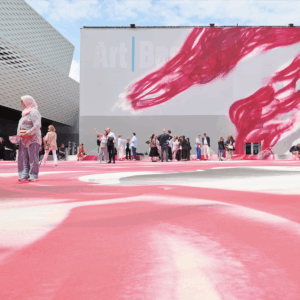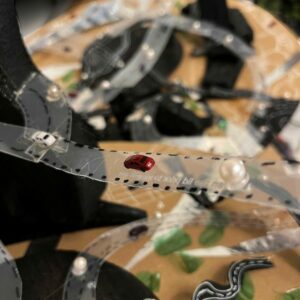Meshal Al Jaser (Instagram) is synonymous with the renaissance of Saudi cinema but if you ask him, he’ll brush that recognition aside with a shrug and a half-smile that always seems to hint at something more. His isn’t a story about a meteoric rise to fame; it’s a tale of a passionate kid channelling a hunger for cinematic expression into something larger than himself. This is about building, not just creating. This is Meshal Al Jaser and his story.

There’s something subtly rebellious about Al Jaser – the quiet intensity masked beneath a playful grin, the flicker of mischief behind his eyes, the easy way he turns a serious question into something lighter, more playful.
He has a knack for subverting expectations. He speaks of his decade-long career as mere “practice,” a playful understatement that belies the groundbreaking impact he’s had on the industry. But Meshal Al Jaser is more interested in the future than dwelling on past achievements. He’s focused on what he can create, not on the accolades he’s already amassed.
At 28, the label “pioneer of modern Saudi cinema” may land awkwardly on his shoulders but the weight of it isn’t lost on him. “I’m very committed to the evolution of Saudi cinema, and I’m dedicating my career to it,” he says, the playful edge replaced with quiet determination.
There’s no false modesty in his words. It’s this mix of grit and disarming humility that makes Al Jaser one to watch. The Saudi film scene was a blank slate when he started. Now, with government backing and a groundswell of talent blossoming in his wake, the future is dazzling. We’re fortunate to have such support,” he says, acknowledging the role of institutions like the Saudi Film Commission and the Ministry of Culture. “They’re taking our industry seriously, and that’s incredibly exciting.” But, inspired by that rebellious spark, Al Jaser isn’t racing toward the Hollywood glitz. “I feel like I just really want to be the best version of myself. And I think hopefully, if I do that, things will fall into the right place.”


Al Jaser’s journey began in the scrappy, unfiltered world of YouTube. “I didn’t even know I was directing,” he recalls of those early days. “I just wanted to tell stories.” He found his tribe on channels like ‘Folaim Ya Gholaim’ and ‘Telfaz11’. These were the rough, DIY workshops of a generation yearning to see themselves reflected on a screen. “It was a very vulnerable time,” Al Jaser admits, “Everyone could see our early work, the growing pains, the lack of polish.” But this public evolution also became his strength.
Anyone who views those early YouTube videos, filled with technical imperfections yet undeniable heart, can chart his trajectory. It’s a celebration of the young filmmaker he once was: the kid so hungry for his own voice that he was willing to learn in public, mistakes on full display. And maybe that’s precisely what makes him this generation’s most important Saudi filmmaker.

Al Jaser knows his work will inspire countless others. But he also understands that his path isn’t the only route to success. “I don’t have grand words of wisdom,” he says, “I’m still figuring it out myself.” He’s not a self-proclaimed guru, but a fellow traveller on the unpredictable road of creativity.
There’s a delicious subversive current that underpins his work. Is he a social commentator? A provocateur? A comedian with something to say? Maybe none and all of these at once. It was “Is Sumiyati Going to Hell?” that catapulted him into the spotlight, but this wasn’t a calculated grab for fame. With raw, sometimes uncomfortable honesty, he turned his lens onto those often unseen – domestic workers, their struggles caught between cultures and power structures. That film was a question mark, a refusal to sweep harsh realities under the rug of polite society, sparking a national dialogue about the often-ignored lives of those working on the margins of Saudi society.
He has a knack for making you laugh until the punch of his films lands, leaving you not with a sermon, but an invitation to linger on a question. “If you can make someone laugh,” he says, “you can share anything with them. Even criticism.” This playful edge is what makes him an outsider, even with accolades starting to pile up.

But don’t mistake Al Jaser for a filmmaker whose sole mission is to expose the gritty underbelly of society. “Arabian Alien” proved he can weave satire and social commentary with a wink and a Sci-Fi twist. He tackled themes of social acceptance and cultural norms, all filtered through the lens of an extraterrestrial encounter gone awry. “It started as a musical project,” he reminisces, “but it evolved as we explored the idea of feeling like an outsider, like an alien in your own world.” Playfulness disguises the punch his films pack. This is what makes his work resonate – it meets the audience halfway, even when the destination is a challenging one.
Success hasn’t made him complacent. He could have chased the glitz of international festivals, but then “Six Windows in The Desert” arrived. This wasn’t about grand statements. It was an intimate exploration of his homeland during a time of forced isolation. These vignettes showcased the humour, the beauty, and the relentless pulse of Saudi life in lockdown – messy, hopeful, and undeniably real.
But the real outsider move came with his debut feature, ‘Naga’. This madcap satirical thriller features a young Saudi woman stranded in the desert, racing against both time and danger to get home before curfew. Bold, brash, sometimes maddening, it premiered at the prestigious Toronto Film Festival, and was the first Saudi film to be selected for their Midnight Madness section. This isn’t the “Hollywood” version of Saudi stories – it’s the messy, stubbornly original heartbeat of a filmmaker refusing to paint within the lines. “It’s my first feature,” he says, “and it definitely has its own language, its own rhythm.” “Naga” is a chaotic, exhilarating ride, a film that refuses to be tamed or categorised.

Al Jaser’s creative process is as unique as his films. He talks about the importance of “a playful headspace,” a sense of childlike wonder that allows him to tap into his most authentic ideas. “Being playful is essential,” he asserts, “If you’re always serious, you might not produce your best work.”
This playful approach is evident in his willingness to experiment, to challenge conventions. “With ‘Naga’,” he explains, “I wanted to tell the story in my own language, not the traditional cinematic language.” This defiance of convention is a hallmark of his artistic signature, a refusal to be confined by pre-existing rules.

The early days saw him practising in public; now, a decade in, he’s proving there are no shortcuts. His path might be the most valuable blueprint for aspiring Saudi filmmakers. It’s messy, it’s human, it’s about dedication, not sudden stardom.
He is here to tell stories…and he’s building the stage on which thousands more can be told. It’s a far slower, grittier cinematic revolution and it’s certainly less flashy than red carpets, but that’s precisely what makes it worth watching, and worth waiting for.
For more arts and culture stories, like this interview with Meshal Al Jaser, visit our dedicated archives.












